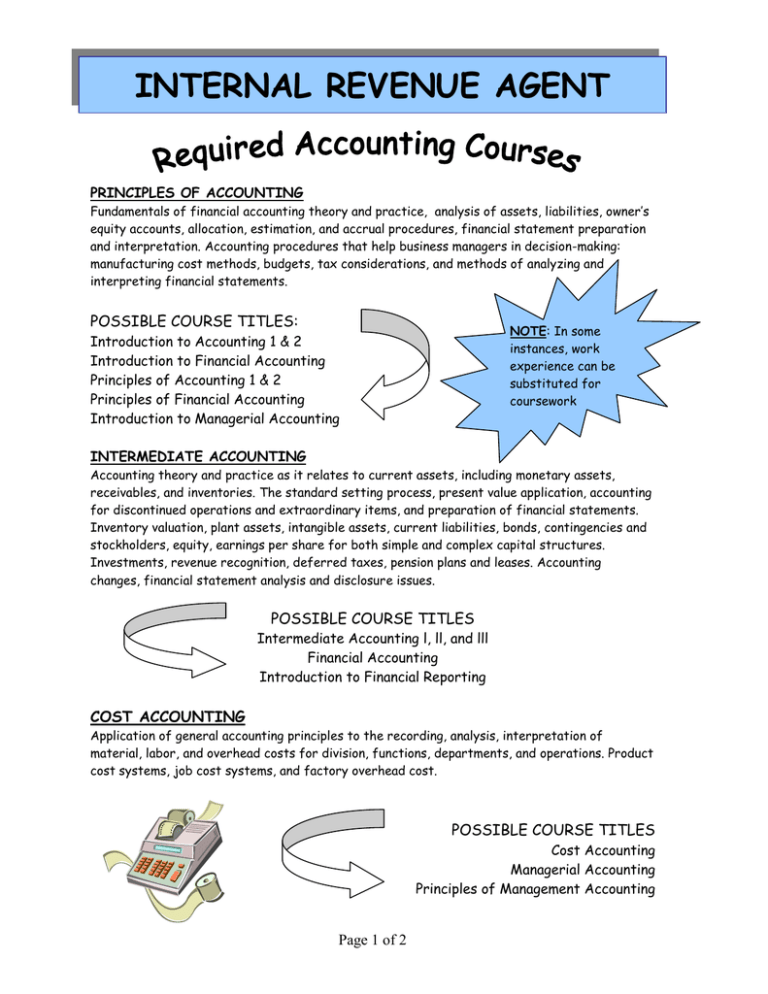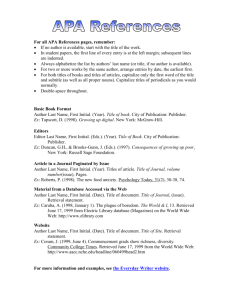INTERNAL REVENUE AGENT PRINCIPLES OF ACCOUNTING
advertisement

INTERNAL REVENUE AGENT PRINCIPLES OF ACCOUNTING Fundamentals of financial accounting theory and practice, analysis of assets, liabilities, owner’s equity accounts, allocation, estimation, and accrual procedures, financial statement preparation and interpretation. Accounting procedures that help business managers in decision-making: manufacturing cost methods, budgets, tax considerations, and methods of analyzing and interpreting financial statements. POSSIBLE COURSE TITLES: NOTE: In some instances, work experience can be substituted for coursework Introduction to Accounting 1 & 2 Introduction to Financial Accounting Principles of Accounting 1 & 2 Principles of Financial Accounting Introduction to Managerial Accounting INTERMEDIATE ACCOUNTING Accounting theory and practice as it relates to current assets, including monetary assets, receivables, and inventories. The standard setting process, present value application, accounting for discontinued operations and extraordinary items, and preparation of financial statements. Inventory valuation, plant assets, intangible assets, current liabilities, bonds, contingencies and stockholders, equity, earnings per share for both simple and complex capital structures. Investments, revenue recognition, deferred taxes, pension plans and leases. Accounting changes, financial statement analysis and disclosure issues. POSSIBLE COURSE TITLES Intermediate Accounting l, ll, and lll Financial Accounting Introduction to Financial Reporting COST ACCOUNTING Application of general accounting principles to the recording, analysis, interpretation of material, labor, and overhead costs for division, functions, departments, and operations. Product cost systems, job cost systems, and factory overhead cost. POSSIBLE COURSE TITLES Cost Accounting Managerial Accounting Principles of Management Accounting Page 1 of 2 ADVANCED ACCOUNTING Highly complex issues such as: current issues in the accounting field, foreign currency transactions and statements, special entities of estates, trusts, and reorganizations, governmental and non-profit accounting, consolidations and mergers, any study that included large organizations with international multi-subdivision impact. POSSIBLE COURSE TITLES Advanced Accounting Advanced Financial Accounting Advanced Accounting Theory Advanced Accounting Problems Advanced Financial Reporting Issues Not-for-Profit Accounting Consolidations and Mergers Consolidations and Partnerships Financial Accounting lll Financial Reporting ll Governmental Accounting Government Entities International Accounting AUDITING Generally accepted auditing standards and procedures used in examining financial statements and supporting procedures used in examining financial statements and supporting records, the auditor’s responsibilities to third parties, the evaluation of the client’s internal control, and the ethics of the profession. POSSIBLE COURSE TITLES Assurance Services Auditing Introduction to Auditing Auditing and Control Auditing Theory and Practice OTHER BUSINESS COURSES – POSSIBLE COURSE TITLES FINANCE Financial Management Financial Accounting Public Finances Investments MATHEMATICS Quantitative Analysis Statistics Business Statistics College Algebra Corporate Finance Business Calculus ECONOMICS Managerial Economics Microeconomics Macroeconomics Applied Economies BUSINESS International Business Business Law Taxation Marketing Business Ethics TOTAL COURSES REQUIRED: 30 hours Accounting OR 24 hours of Accounting and 6 hours of other Business Courses. Under either qualifying coursework criteria, you will need at least one course in each of the five accounting areas listed above. Page 2 of 2



